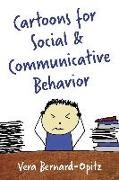Share
Fr. 28.20
Vera Bernard-Opitz, Andra Bernard
Comics for Social and Communicative Behavior
English · Paperback / Softback
Shipping usually within 3 to 5 weeks (title will be specially ordered)
Description
During the first years in school children need to learn reading, writing and arithmetic, but it seems equally important to develop social and communicative skills and good values. While there are plenty of teaching programs on the "Three Rs" it is not easy to find curricula for social behavior and character development.
This workbook provides a clear teaching sequence on eight long-term objectives, such as being reliable, authentic, empathetic, self-controlled and a good team player. In 130 cartons daily problem situations are pictured and possible solutions are presented. While making good value choices children learn at the same time to become competent communicators. Typical as well as well as special needs students are encouraged to pro-social behaviors which are a solid foundation for school, social and future professional success.
Vera Bernard-Opitz, Ph.D. is a Board Certified Behavior Therapist (BCBA-D) who works internationally as author, speaker and supervisor.
List of contents
Introduction
Method of the Social Cartoon Curriculum
A) Examples for positive behavior in elementary school
STAR Program
S = Safety First
T = There and Ready
A = Act responsible
R = Respect self and others
S - Safety First
T - There and Ready
A - Act responsible
R - Respect self and others
B) Long-Time Goals (LTG) for social behavior
LTG 1 Being kind, popular and making friends
STG 1 Following instructions
STG 2 Taking the perspectives of others
STG 3 Helping and respecting others
STG 4 Being helpful
STG 5 Being humble
LTG 2 Being responsible and reliable
STG 1 Respecting instructions
STG 2 Doing what you promised
STG 3 Doing what is expected
STG 4 Taking responsibility for others and the environment
STG 5 Time management and being on time
LTG 3 Having good team skills
STG 1 Setting team-goals
STG 2 Accepting criticism
STG 3 Suggesting or accepting compromises
STG 4 Being fair
C) Goals for positive personality characteristics
LTG 4 Being optimistic
STG 1 Never give up
STG 2 Thinking positive about yourself and others
STG 3 Taking chances and giving others a chance
LTG 5 Dealing with frustration and using coping strategies
STG 1 Dealing with the fear of failing
STG 2 Dealing with losses and thinking positive
LTG 6 Being loyal and trustworthy
STG 1 Being loyal
STG 2 Being real and self-confident
STG 3 Being honest even though you fear punishment or disadvantages
LTG 7 Being self-controlled
STG 1 Being aware of yourself and others
STG 2 Dealing with stress
D) Goals for communicative competence
LTG 8 Being a good conversational partner
STG 1 Giving compliments
STG 2 Apologizing and making up for mistakes
STG 3 Clarifying misunderstandings
STG 4 "You talk" instead of "Me talk"
STG 5 Showing interest towards others and paying attention
STG 6 Showing gratitude
About the author
Vera Bernard-Opitz is an American BCBA-D and German psychotherapist and behavior therapist, who has worked in Germany, Singapore, and the United States. She has assessed and treated more than 1000 children with Autism Spectrum Disorders (ASD) in autism research centers, rehabilitation centers, special needs schools, and homes. She studied Psychology at the University of Göttingen, conducting her Ph.D. research in Göttingen and the University of California Santa Barbara. For seven years she headed the Psychological Services unit at a rehabilitation center near Heidelberg, where she set up behavioral programs for individuals with ASD. Her research on computer-assisted instruction was funded by the German Research Foundation (DFG). For twelve years she was Associate Professor of Psychology at the National University of Singapore, mainly teaching Abnormal Psychology and Behavior Modification. During this period she initiated the first autism program in Singapore (STEP), where she coordinated training and research activities at the Behavior Intervention Center of the university. Here in Southern California, she has supervised home-programs for a private ABA-company. For the last eight years she has been an international consultant, spearheading tele-health for individuals with behavior challenges and varying levels of capabilities. She has written several books focusing on behavior intervention, curriculum development and social skills training. The fourth edition of her curriculum guide Children and Adolescents with ASD has recently been published by Kohlhammer Publishing. Her cartoon-book Teaching-goals: Communication and Social Behavior has just been published in German and is in manuscript in English by Future Horizon. She has edited the Autism Concrete Series with eight published books from internationally recognized authors. Vera Bernard-Opitz lives with her family most of the year in Irvine, California. She spends three to four months in her home in the nice city of Hildesheim from where she gives practice workshops throughout Germany.
Summary
Provides a clear teaching sequence on eight long-term objectives, such as being reliable, authentic, empathetic, self-controlled and a good team player. In 130 cartoons daily problem situations are pictured and possible solutions are presented. While making good value choices children learn at the same time to become competent communicators.
Product details
| Authors | Vera Bernard-Opitz |
| Assisted by | Andra Bernard (Illustration) |
| Publisher | Future Horizons |
| Languages | English |
| Product format | Paperback / Softback |
| Released | 31.05.2021 |
| EAN | 9781949177671 |
| ISBN | 978-1-949177-67-1 |
| No. of pages | 113 |
| Dimensions | 216 mm x 276 mm x 15 mm |
| Weight | 431 g |
| Subjects |
Guides
> Self-help, everyday life
> Family
Natural sciences, medicine, IT, technology > Medicine > Clinical medicine |
Customer reviews
No reviews have been written for this item yet. Write the first review and be helpful to other users when they decide on a purchase.
Write a review
Thumbs up or thumbs down? Write your own review.

